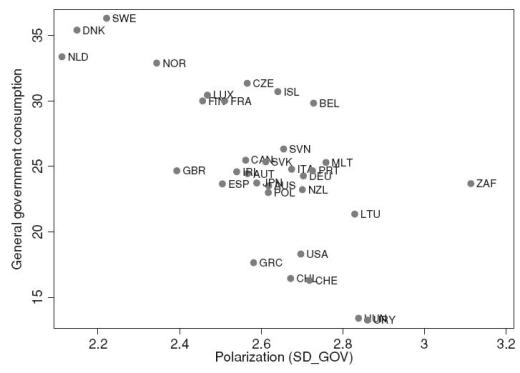I det senaste numret av American Political Science Review dyker nedanstående figur upp. Figuren visar att det finns en stark korrelation mellan den offentliga sektorns storlek och i vilken utsträckning människor tenderar att hålla med varandra i ekonomisk-politiska frågor. De nordiska länderna och Nederländerna (längst upp till vänster i figuren) är exempel på länder med stor offentlig sektor och liten spridning i ekonomisk-politiska åsikter, medan Uruguay (längst ned till höger) är ett exempel på motsatsen.
 En tolkning av den här korrelationen är att det är lättare att utvidga den offentliga sektorn om människor är överens om ekonomisk-politiska prioriteringar. Sambandet är också i linje med en del tidigare studier som finner att större etnisk mångfald samvarierar med mindre offentliga utgifter (se till exempel den här studien av Alberto Alesina och medförfattare).
En tolkning av den här korrelationen är att det är lättare att utvidga den offentliga sektorn om människor är överens om ekonomisk-politiska prioriteringar. Sambandet är också i linje med en del tidigare studier som finner att större etnisk mångfald samvarierar med mindre offentliga utgifter (se till exempel den här studien av Alberto Alesina och medförfattare).
Sambandet mellan polarisering och offentlig sektors storlek är starkt bland demokratier och kvarstår när man kontrollerar för en mängd olika faktorer (bland annat etnisk mångfald). Artikeln utgår dock från tvärsnittsdata vid en tidpunkt och att det därför är svårt att säga med säkerhet att det är polarisering som påverkar storleken på den offentliga sektorn. Ett tecken på att det är på detta vis är dock att sambandet åtfinns bland demokratier, men inte bland icke-demokratier.
På sätt och vis är detta en artikel som väcker fler frågor än som besvaras. Artikelförfattare är hursomhelst undertecknad och Erik Lindqvist (som nu är tillbaka på Handels efter två år på IFN). En gratisversion av artikeln hittar ni här.
Nu har jag inte läst hela artikeln, men är det inte ett problem att offentlig sektor i regel betyder olika saker i demokratier och icke-demokratier? Hårddraget: Att korruption och stor militär inte minskar polariseringen betyder inte att utbildning och ekonomisk omfördelning inte gör det.
Grattis till publiceringen!
Pär, du har helt rätt, ”demokratiargumentet” för kausalitet är inte klockrent. Vi försöker dock på olika vis kontrollera för att utbildning och omfördelning skulle minska polariseringen (vilket jag håller med om är en mycket rimlig mekanism), men det verkar inte vara så.
Det är en intressant debatt huruvida som Bo Rothstein och ni verkar hävda att den Socialdemokratiska, ej menat i pejorativ eller värderande mening, generella välfärdsstaten med allomfattande allmän välfärd, stor inkomstutjämning, höga skatter samt starka fackföreningar leder till högre förtroende bland medborgarna eller om det är som Tino Sanadji verkar hävda att det är ett specifikt socio-kulturellt mönster i Nord Europa och att välfärdsstaten med den påföljande omfattande offentliga sektorn inte är det som skapar förtroendet.
Tino Sanadji hade precis ett inlägg om detta på sin blogg två dagar innan ditt inlägg.
Proving Bo Rothstein wrong: Why do Swedes trust more? Culture, not welfare state policy
Old whig, i artikeln argumenterar vi för att sammanhållning (i bemärkelsen liten spridning i åsikter) leder till en stor stat, inte vice versa. Däremot har vi inget svar på vilka faktorer som avgör spridning i åsikter — kanske är det kulturella faktorer eller ett resultat av tidigare politik.
Robert i denna nyutkomna bok kanske det finns en del svar.
från blogen EconoLog inlägget av Arnold Kling
Culture and Institutions
Fred Pryor has a new book, called Capitalism Reassessed, a title which does not really say what the book is about. He uses various qualitative data sources to classify OECD economies into subsets. Some excerpts from the book below the fold.
p. 40:
He is offering this as one explanation for the failure of capitalism to emerge in India and China. In contrast, the UK and northwest Europe were able to overcome environmental constraints by obtaining crops from the New World.
Using a number of institutional indicators and letting the data pick the classifications through cluster analyis, Pryor finds four groups of countries within the OECD (the richest countries). The U.S. falls within a group that consists mostly of Anglo-Saxon countries, where (p. 97):
In the Scandinavian countries, which he calls the Nordic cluster (p.98)